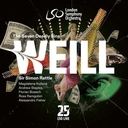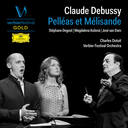Vivaldi’s rare oratorio enjoyed an exquisite performance by Venice Baroque under Andrea Marcon, the Guildhall Consort and a wealth of soloists
Vivaldi’s oratorio Juditha Triumphans was first performed in 1716 at the Ospedale della Pietà, the Venetian orphanage-cum-conservatoire where he was composer in residence, and was given a rare modern outing here by the Venice Baroque Orchestra under Andrea Marcon. Written for female voices and orchestra, the oratorio overlays the Biblical narrative of Judith and Holofernes with allusions to contemporary conflict between the Venetian republic and Ottoman empire. We’re not, however, dealing with blatant propaganda. Vivaldi’s Holofernes is an intelligent charmer as well as an implacable militarist; Judith’s politically motivated progress from seductress to murderess is fraught with moral confusion. The score fuses the erotic with the devotional – it’s overwhelmingly beautiful.
A work in which the protagonists are all played by mezzos makes casting difficult, but Marcon assembled an outstanding lineup. The concert was billed as a vehicle for Magdalena Kožená in the title role, and indeed she has done nothing finer, singing with great lustre and remarkable subtlety of characterisation: the way in which she gradually revealed Judith’s innate loathing of Holofernes beneath the femme fatale allure was superbly done. Here, however, she was a star among equals, her poise contrasted with the sensual refinement of Delphine Galou’s Holofernes and the breathtaking virtuosity of Ann Hallenberg as his sidekick Vagaus. Silke Gäng was Judith’s fanatical maid, Abra, Francesca Ascioti the principled high priest Ozias. Venice Baroque play Vivaldi better than anyone nowadays, and the choral singing from the Guildhall Consort was exquisite. Staggering, all of it, from start to finish.
© Tim Ashley, the Guardian



